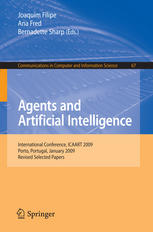

Most ebook files are in PDF format, so you can easily read them using various software such as Foxit Reader or directly on the Google Chrome browser.
Some ebook files are released by publishers in other formats such as .awz, .mobi, .epub, .fb2, etc. You may need to install specific software to read these formats on mobile/PC, such as Calibre.
Please read the tutorial at this link: https://ebookbell.com/faq
We offer FREE conversion to the popular formats you request; however, this may take some time. Therefore, right after payment, please email us, and we will try to provide the service as quickly as possible.
For some exceptional file formats or broken links (if any), please refrain from opening any disputes. Instead, email us first, and we will try to assist within a maximum of 6 hours.
EbookBell Team

4.4
92 reviewsThe present book includes a set of selected papers from the First International Conf- ence on Agents and Artificial Intelligence (ICAART 2009), held in Porto, Portugal, during January 19–21, 2009. The conference was organized in two simultaneous tracks: “Artificial Intelligence and Agents.” The book is based on the same structure. ICAART 2009 received 161 paper submissions, from more than 37 different co- tries in all continents. After a blind review process, only 26 where accepted as full papers, of which 21 were selected for inclusion in this book, based on the classifi- tions provided by the Program Committee. The selected papers reflect the interdis- plinary nature of the conference. The diversity of topics is an important feature of this conference, enabling an overall perception of several important scientific and tech- logical trends. These high-quality standards will be maintained and reinforced at ICAART 2010, to be held in Valencia, Spain, and in future editions of this conf- ence. Furthermore, ICAART 2009 included five plenary keynote lectures given by Juan Carlos Augusto (University of Ulster), Marco Dorigo (IRIDIA, Free University of Brussels), Timo Honkela (Helsinki University of Technology), Edward H. Shortliffe (Arizona State University) and Paulo Urbano (University of Lisbon). We would like to express our appreciation to all of them and in particular to those who took the time to contribute with a paper to this book.